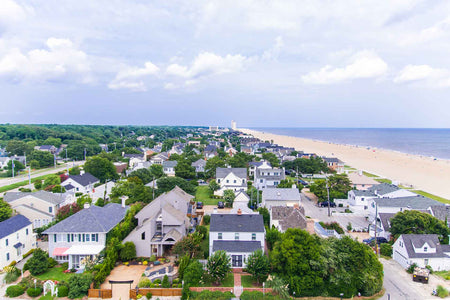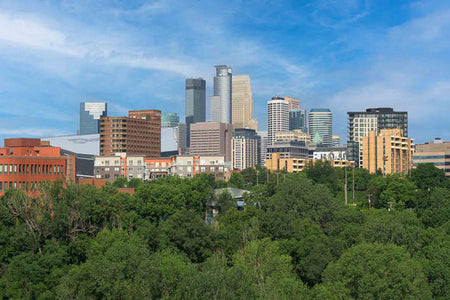- North Carolina’s allergy season runs from late February to December. Different allergens peak at different times.
- The worst months for allergies are April (tree pollen), May (grass pollen), and September (weed pollen). Mold spores are a year-round issue due to North Carolina’s humid climate.
- Managing allergies involves monitoring pollen counts, reducing indoor humidity, and starting treatments early.
From the Blue Ridge Mountains to the Outer Banks, North Carolina is a dream for nature lovers — but also for allergens. Pollen season starts in February and lingers through December, with different allergens taking turns filling the air.
It’s important to know not just when allergens peak, but also which ones trigger your symptoms the most.
This article will guide you through North Carolina's allergy season, including peak months, common allergens, and tips to manage symptoms.
When is the Allergy Season in North Carolina?
In North Carolina, allergy season starts in late February and lasts until December. Different types of pollen peak at different times.
Tree pollen is highest from February to June, making many people sneeze and have itchy eyes. Grass pollen spreads from April to September, and weed pollen is worst from August to December.
Because North Carolina is humid, mold spores are also a common problem all year.
What are the Worst Months for Allergies in North Carolina?
The toughest months for allergies in North Carolina are April, May, and September. During these months, pollen levels are at their highest. This makes it harder for allergy sufferers to avoid symptoms like sneezing, itchy eyes, and congestion.
- April: Tree pollen, especially from oak, pine, and maple, is at its peak.
- May: Grass pollen, including Bermuda grass, ryegrass, and Kentucky bluegrass, is most active.
- September: Weed pollen becomes the biggest trigger as summer turns to fall. Ragweed, in particular, causes allergy flare-ups during this time.
When Does Allergy Season End in North Carolina?
In North Carolina, allergy season usually ends in December after the first hard frost. However, the exact timing depends on the weather. A warmer winter can keep pollen in the air longer, while an early frost can bring relief sooner.
Even when outdoor pollen levels drop, indoor allergens like dust mites, mold, and pet dander can still cause symptoms. North Carolina's humid climate also makes mold spores a year-round problem, especially in damp areas like basements and bathrooms [*].
Common Allergens in North Carolina
North Carolina has a long allergy season with different allergens appearing throughout the year. Tree, grass, and weed pollen are the most common outdoor triggers, while indoor allergens like dust mites, mold spores, and pet dander can cause problems year-round.
Tree pollen peaks in early spring, especially in April:
- Oak
- Pine
- Maple
- Birch
- Cedar
- Hickory
- Yellow poplar
Grass pollen peaks in late spring and summer. They include:
- Bermuda
- Rye
- Fescue
- Timothy grass
- Kentucky bluegrass
- Johnson
- Bahia
Weed pollen peaking in September include:
- Ragweed
- Sagebrush
- Pigweed
- Lamb's quarters
- Nettle
These indoor allergens are present year-round:
- Dust mites (can be found in bedding, carpets, and upholstered furniture)
- Mold spores (thrives in damp areas)
- Pet dander (shedding skin flakes from cats, dogs, and other furry animals)
How to Prepare for Seasonal Allergies in North Carolina
If you suffer from seasonal allergies in North Carolina, a few simple habits can make a big difference. Try these tips to limit your exposure:
-
Monitor pollen levels: Check daily pollen forecasts and try to stay indoors when counts are high, especially on windy days.
-
Keep windows closed: Pollen can easily enter your home through open windows. Use air conditioning instead to keep the air clean.
-
Use HEPA filters: High-efficiency filters in your HVAC system and air purifiers can trap pollen, dust, and other allergens.
-
Reduce indoor humidity: Mold thrives in damp environments. Using a dehumidifier can help keep moisture levels low, especially in basements and bathrooms [*].
-
Limit outdoor activities during peak times: Pollen levels are usually highest in the early morning and late afternoon. If possible, schedule outdoor activities at midday or in the evening.
-
Wear a mask, sunglasses, and hat: A mask can help filter out pollen, sunglasses protect your eyes, and a hat prevents pollen from getting in your hair.
-
Leave your shoes at the door: Pollen can stick to your shoes and spread throughout your home. Keep them near the entrance to reduce exposure.
-
Shower and change clothes: After being outside, washing off pollen and changing clothes can help prevent allergens from lingering indoors.
-
Clean regularly: Vacuuming carpets, washing bedding often, and dusting surfaces can reduce allergens in your home.
- Take allergy medications early: If you have seasonal allergies, start taking antihistamines or other allergy medications before symptoms become severe. Talk to your doctor about the best options for you.
The Bottom Line
Tree pollen is the biggest problem in spring, grass pollen in summer, and weed pollen in fall. Even in winter, indoor allergens like dust, mold, and pet dander can still cause symptoms.
The best way to manage allergies in North Carolina is to take steps to reduce exposure and start treatment early. If you're looking for fast and effective relief, Allermi’s combination nasal spray can help. It’s designed with up to four targeted ingredients to treat all your allergy symptoms in one simple spray. Learn more here.
References:
- A brief guide to mold, moisture and your home | US EPA. (2025, February 24). US EPA. https://www.epa.gov/mold/brief-guide-mold-moisture-and-your-home
- Bernstein, J. A., Levin, L., Crandall, M. S., Perez, A., & Lanphear, B. (2005). A pilot study to investigate the effects of combined dehumidification and HEPA filtration on dew point and airborne mold spore counts in day care centers. Indoor air, 15(6), 402–407. https://doi.org/10.1111/j.1600-0668.2005.00379.x









